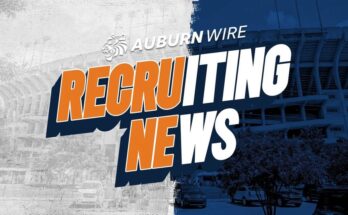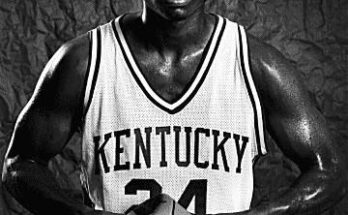Next Man Up: Jeremiah Cobb Poised to Lead Auburn’s Backfield in Post-Hunter Era
As the Auburn Tigers prepare for the upcoming 2025 football season, one storyline looms large over the Plains: life without star running back Jarquez Hunter. Hunter, who had been the cornerstone of Auburn’s ground game for the past few seasons, left an unmistakable imprint on the program with his explosive runs, game-changing plays, and unwavering leadership. His departure leaves a massive void in the backfield—one that must be filled not only with talent, but with consistency, maturity, and poise under pressure. Enter Jeremiah Cobb, the sophomore running back who now finds himself in the spotlight, with expectations soaring and opportunity knocking louder than ever.
Cobb’s rise within the Auburn program has been steady but unmistakable. As a freshman, he showed flashes of the kind of dynamic skill set that could one day make him a star. While his touches were limited behind Hunter and others, each carry seemed to offer a glimpse of what could be. Vision, burst, agility—traits that can’t be taught—were evident whenever he got the ball in his hands. But now, the training wheels are off. There’s no safety net. The Tigers are turning the page, and Cobb is expected to be one of the new faces driving this offense forward.
Replacing someone like Jarquez Hunter isn’t just about statistics. Yes, the yards, touchdowns, and highlight runs matter, but Hunter’s value extended beyond the numbers. He was a tone-setter, a leader in the locker room, and a player who opposing defenses had to game-plan around. That kind of presence doesn’t get replaced overnight. It takes time—and more importantly, it takes the right kind of player. Auburn’s coaching staff believes Jeremiah Cobb can be that player. Not necessarily by being a carbon copy of Hunter, but by bringing his own strengths to the table and forging a new identity for the Tigers’ backfield.
One of the most impressive aspects of Cobb’s game is his versatility. He’s not just a north-south runner; he’s a multi-dimensional threat who can be deployed in a variety of ways. Whether it’s catching passes out of the backfield, navigating traffic between the tackles, or bouncing outside with speed, Cobb offers Auburn a dynamic option who can keep defenses guessing. That versatility is especially critical in today’s college football landscape, where offenses are more complex and defenses more athletic. Gone are the days of relying on a single skill set—today’s top backs need to be Swiss Army knives, and Cobb fits that mold perfectly.
But talent is only part of the equation. With Hunter gone, Cobb will have to shoulder a much heavier workload—both physically and mentally. The SEC is unforgiving. Every game is a battle, and durability matters as much as explosiveness. Can Cobb handle 15 to 20 touches a game? Can he be the reliable option on third-and-short? Can he protect the quarterback when blitzes come flying in from every direction? These are the questions that will define his sophomore season, and his answers will help shape the Tigers’ offensive identity.
The transition also comes with immense pressure. Auburn fans are passionate, knowledgeable, and vocal. They know what a great running back looks like. From Bo Jackson to Cadillac Williams to Tank Bigsby to Jarquez Hunter, this program has a long history of elite runners. That legacy creates both a standard and an expectation, and Cobb is stepping into that lineage. But there’s a quiet confidence about him that suggests he’s not only aware of what’s expected—he’s embracing it. He doesn’t need to be a finished product on Day One, but he does need to show growth, grit, and flashes of brilliance that suggest he can be the next in that proud line.
There’s also the matter of chemistry with the rest of the offense. With the quarterback situation still in flux, and a relatively young offensive line trying to gel, Cobb’s ability to be a steadying force could be invaluable. A reliable running back can be a young quarterback’s best friend, offering a safety valve in the passing game and helping to control tempo through a strong ground attack. Cobb’s development could directly influence the comfort level and rhythm of whoever wins the quarterback battle, making his presence even more essential to the team’s overall success.
Don’t be surprised if the coaching staff leans heavily on Cobb early in the season. In the opening weeks, while timing is still being fine-tuned and the offense is working out its kinks, having a dependable, explosive back can help smooth out the bumps. Cobb may not touch the ball 30 times a game, but his usage rate will certainly increase. Red zone carries, screen passes, check-downs on third down—he’ll be involved in every phase. And if he can break off a few long runs early in the year, confidence will grow not just in him, but in the offense as a whole.
Behind Cobb, there’s talent in the running back room, but much of it is unproven. That only adds to the urgency for him to step into a lead role. Depth is always important in the SEC—injuries are inevitable, and no back makes it through a full season without some wear and tear—but every team needs a clear No. 1. Someone who sets the tone. Someone who gets the tough yards, makes defenders miss, and gives the offense an identity. Right now, Jeremiah Cobb looks like that guy.
The coaching staff has been deliberate in preparing him for this moment. His workload during spring practices was increased, and reports from the offseason suggest he’s taken the next step physically and mentally. Stronger, more confident, and more vocal in meetings—Cobb is starting to understand what leadership in the backfield really looks like. And that’s key. Because talent alone doesn’t carry you through an SEC season. You need toughness. You need focus. And you need the kind of mental resilience that allows you to bounce back from a fumble or a blown assignment without letting it snowball.
There’s also a sense that Cobb’s emergence could unlock new elements of Auburn’s playbook. With his ability to catch passes and operate in space, offensive coordinators have more freedom to get creative—mixing in option looks, swing passes, misdirection screens, and more. That kind of flexibility can open up lanes for other players as well, creating a more unpredictable, multidimensional offense. And unpredictability is a weapon in a conference where defenses are fast, aggressive, and well-coached.
Make no mistake: Cobb’s journey won’t be linear. There will be games where things don’t go according to plan—where the holes aren’t there, or the defense keys in on him. That’s part of the learning curve. But the key for Auburn is to stay committed to his development. Even in tough moments, he needs the ball in his hands. Confidence grows through repetition, and Cobb needs to feel like the offense runs through him, even when the numbers don’t pop off the stat sheet.
As the 2025 season kicks off, the narrative around Auburn will focus on change—new leaders, new roles, and a new era without one of their most reliable offensive weapons. But in that change lies opportunity. For Jeremiah Cobb, this is more than just a promotion to RB1. It’s a chance to define his own legacy, to become the next great Auburn running back, and to carry the torch into a new chapter of Tigers football.
He won’t be alone. He’ll have teammates around him, coaches guiding him, and fans cheering him on. But when the ball is snapped and the lights are brightest, it will be Cobb standing in the backfield, with the weight of tradition behind him and the promise of the future in front of him. The question isn’t whether he’s ready. The question is how high he’ll rise.
In many ways, Auburn’s 2025 success will be tied to Cobb’s performance. If he flourishes, so will the offense. If he stumbles, the team will have to scramble to fill the gap. That’s the nature of the position—it carries risk, but also immense reward. For Cobb, the stage is set. The opportunity is real. And the time is now. Auburn is moving forward, and Jeremiah Cobb is leading the charge.



